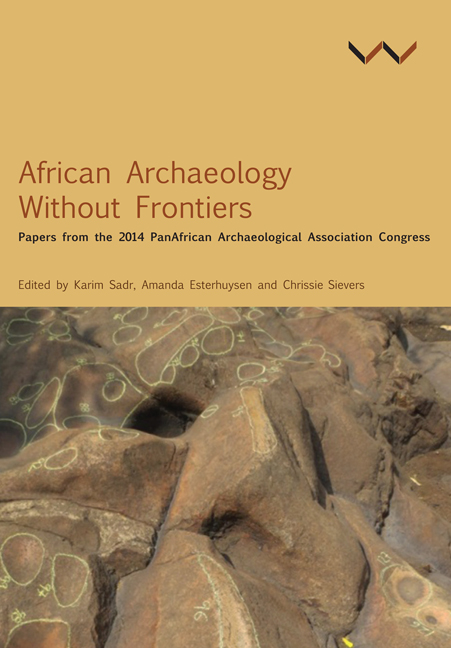 African Archaeology Without Frontiers
African Archaeology Without Frontiers Book contents
- Frontmatter
- Contents
- Acknowledgements
- List of Figures and Tables
- Introduction: An Invitation Fulfilled
- Keynote Address 1: Imagining an African Archaeology Without Frontiers
- Keynote Address 2: A Continental Vision for African Archaeology
- 1 The ‘Useable’ Archaeology of African Farming Systems
- 2 Defining Cultural Heritage among the Makonde of Tanzania
- 3 The Indigenous Roots of Swahili Culture in Pangani Bay, Tanzania
- 4 Is This an Anvil? Iron Bloom Crushing Sites in Northern Togo
- 5 L'art Rupestre au Cameroun, Nouvelles Découvertes et Contribution à L'iconographie Sous-Régionale
- 6 Archaeology and History in Iron Age Settlements in the Congo Basin
- 7 Learning from Glass Trade Beads at Thabadimasego, Botswana
- 8 Blurring Boundaries: Forager–Farmer Interactions in the Middle Limpopo Valley
- 9 Heritage Management and the World Wide Web: South African Challenges
- Contributors
- Index
2 - Defining Cultural Heritage among the Makonde of Tanzania
Published online by Cambridge University Press: 15 March 2018
- Frontmatter
- Contents
- Acknowledgements
- List of Figures and Tables
- Introduction: An Invitation Fulfilled
- Keynote Address 1: Imagining an African Archaeology Without Frontiers
- Keynote Address 2: A Continental Vision for African Archaeology
- 1 The ‘Useable’ Archaeology of African Farming Systems
- 2 Defining Cultural Heritage among the Makonde of Tanzania
- 3 The Indigenous Roots of Swahili Culture in Pangani Bay, Tanzania
- 4 Is This an Anvil? Iron Bloom Crushing Sites in Northern Togo
- 5 L'art Rupestre au Cameroun, Nouvelles Découvertes et Contribution à L'iconographie Sous-Régionale
- 6 Archaeology and History in Iron Age Settlements in the Congo Basin
- 7 Learning from Glass Trade Beads at Thabadimasego, Botswana
- 8 Blurring Boundaries: Forager–Farmer Interactions in the Middle Limpopo Valley
- 9 Heritage Management and the World Wide Web: South African Challenges
- Contributors
- Index
Summary
Abstract
This paper examines understandings of cultural heritage resources among communities in the Mtwara region of Tanzania, and suggests possible measures for their sustainable conservation. It explores the extent to which local communities are engaged in the conservation of cultural heritage resources, and investigates the levels of awareness and understanding of cultural heritage in the region. In this regard, the paper presents and discusses some of the research findings showing how local Mtwara communities view and understand cultural heritage resources. Community-based methods were used in the process of data collection including interviews, archaeological ethnography and focused group discussion. These revealed both tangible and intangible cultural heritage resources to be in a poor state of conservation. The research suggests this situation stems from a wide range of causes including a lack of awareness of the value of cultural heritage resources, as well as the impact of modern economic establishments. The tangible and intangible cultural heritage resources in Mtwara region are deteriorating at an alarming rate and no measures are being taken to rescue these precious resources.
Introduction
The Mtwara region forms part of the Swahili coast and includes the offshore islands of Comoros, Zanzibar and Pemba as well as the northern parts of Madagascar (Horton 1996; Chami 2005). It borders Lindi region to the north, the Indian Ocean to the east and is separated by the Ruvuma River from Mozambique in the south (figure 2.1). To the west it borders the Ruvuma region. The region occupies 16 729 km2 or 1.9 % of Tanzania's mainland area of 945 087 km2 (Tanzania Tourist Board 2012). The majority of the indigenous people of the region are of Bantu origin. The most dominant groups include the Makonde of Newala, Tandahimba, Masasi and Mtwara rural. Other groups are the Makua of Masasi and Mtwara rural, and the Yao who also live in Masasi (Tanzania Tourist Board 2012). The Mozambican Makonde groups inhabit the northern part of Mozambique in the Cabo Delgado province. Their core area is the Plano Alto de Mueda, the high plateau rising to about 600 m above sea level from the southern bank of River Ruvuma. On the northern bank, in Tanzania, the Tanzanian Makonde have their traditional homeland on a similar high plateau in Mtwara, the Makonde Plateau (Saetersdal 1999).
- Type
- Chapter
- Information
- African Archaeology Without FrontiersPapers from the 2014 PanAfrican Archaeological Association Congress, pp. 32 - 47Publisher: Wits University PressPrint publication year: 2016
